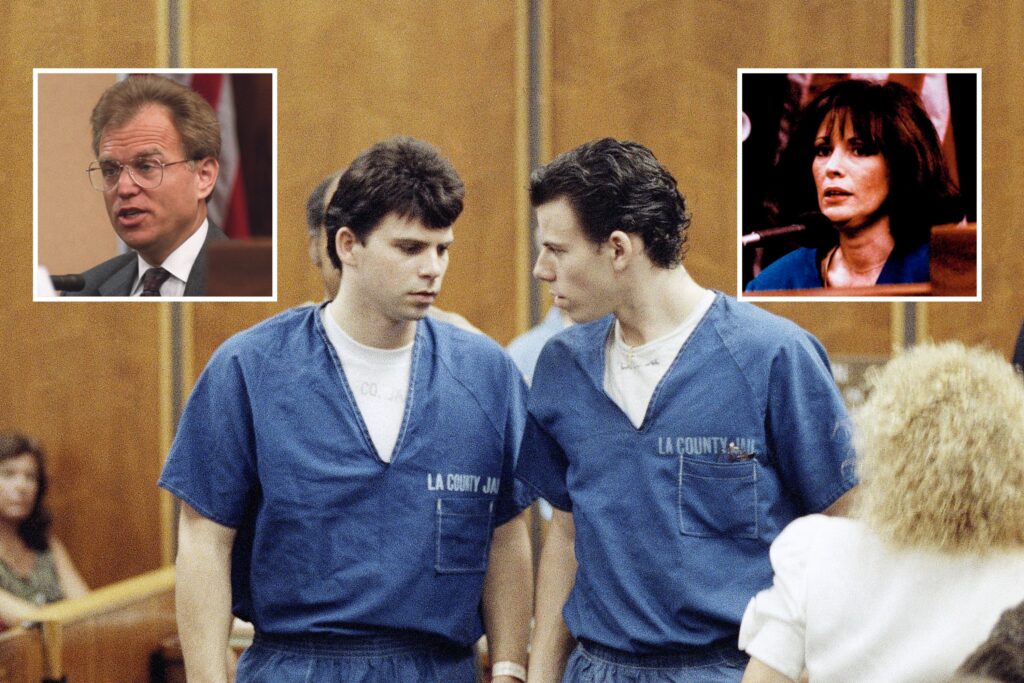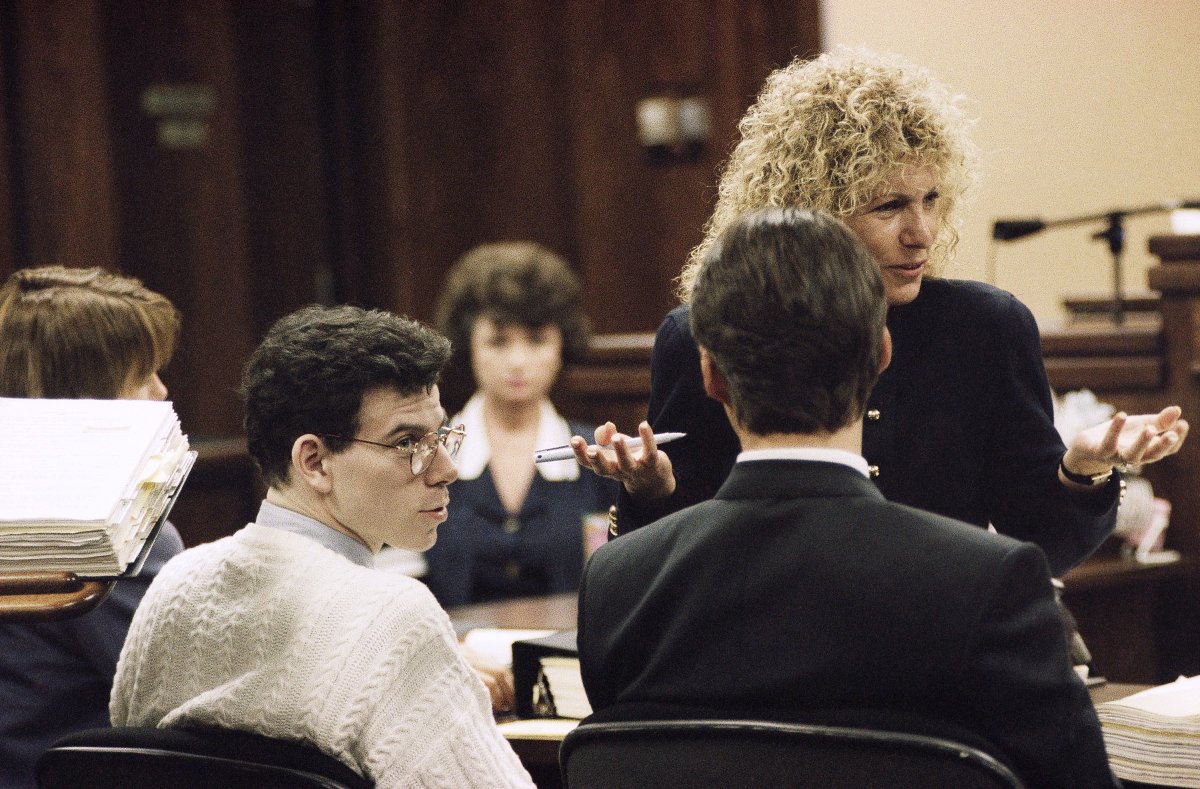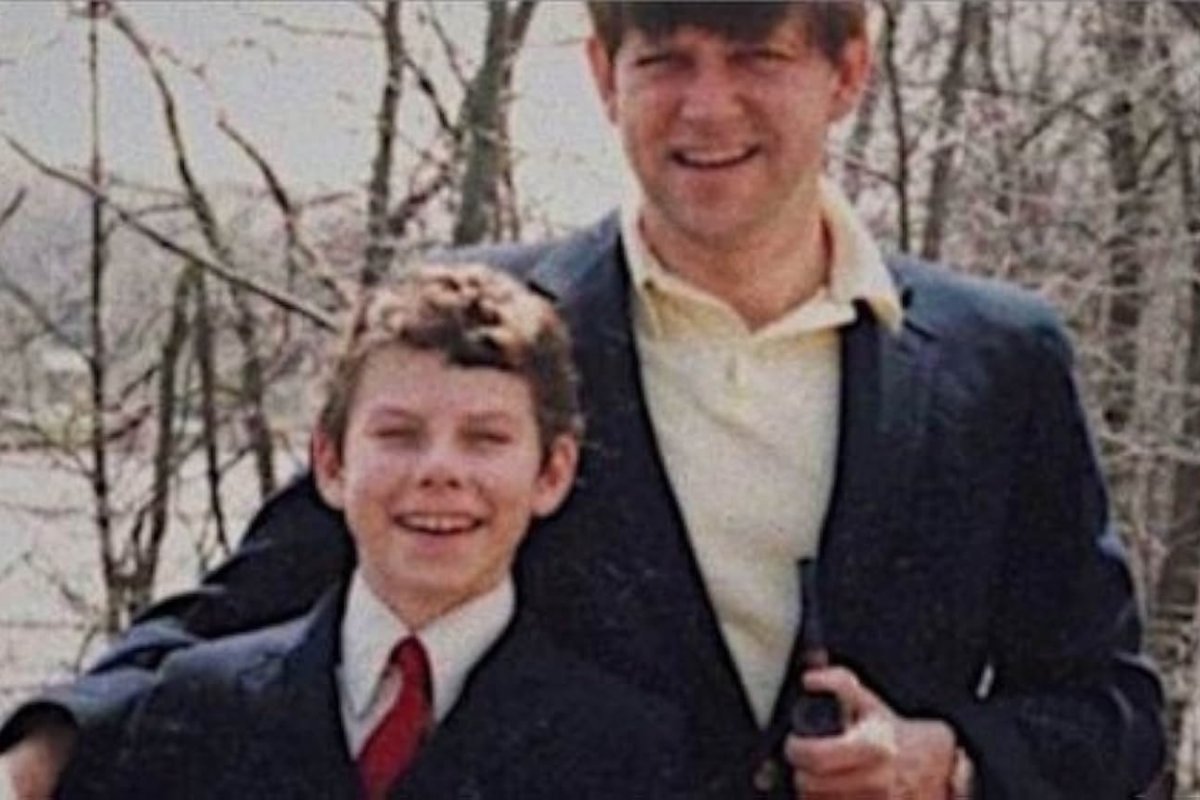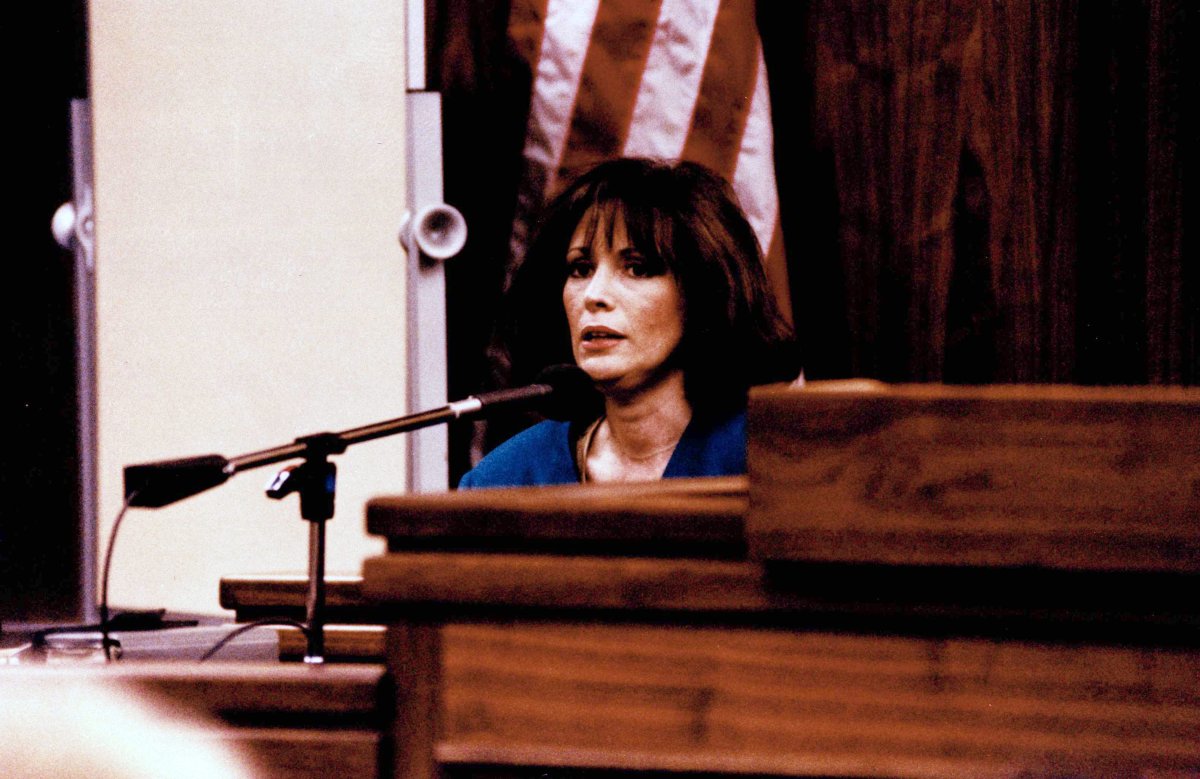
How Therapist At Center of Menendez Brothers’ Case Broke Patient Privilege
Experts talk to Newsweek about how the controversial breach of psychologist-patient confidentiality by the Menendez brothers’ therapist, who recorded Erik Menendez’s confession to his parents’ murders, became a central issue in their trials.
Lyle Menendez, 21, and Erik Menendez, 18, admitted to fatally shooting their parents but claimed they acted out of fear their father, who had sexually abused Erik for years, was about to kill them to keep the abuse a secret.
The duo shot their father Jose Menendez five times, including once at point-blank range with a shotgun aimed at the back of his head. Their mother Kitty Menendez was shot in her chest, arm, hip and leg. As she attempted to crawl away, Lyle reloaded and shot her in the face with a shotgun in their Beverly Hills home.
A total of 14 shots were fired.

From left to right: Lyle Menendez, Kitty Menendez, Jose Menendez and Erik Menendez
IMDb
Psychologist Should Have Consulted Lawyers Before Menendez Disclosure
Newsweek spoke to Jin Lew, an attorney representing patients in cases involving personal injury and medical malpractice.
He stated psychiatrist, Dr. Jerome Oziel, involved in the Menendez case should have consulted a lawyer before revealing any patient information to assess whether doing so would violate patient privilege.
Lew emphasized the heightened sensitivity of information shared within a psychiatrist-patient relationship, noting it should be strictly protected. However, exceptions to this confidentiality exist, particularly when a patient poses an imminent threat.
“If a psychiatrist receives information from a patient indicating they are about to commit a crime, there can be a reasonable argument that disclosure becomes necessary,” Lew said.

FILE – Psychologist Dr. Jerome Oziel appears on the stand in Van Nuys Superior Court in Los Angeles, Aug. 5, 1993. Oziel, who tipped police to Lyle and Erik Menendez’s killing of their parents surrendered his license Friday Jan. 3, 1997 amid accusations he violated the brothers’ confidence and had a sexual relationship with patients.
Nick Ut/AP Photo
In high-profile cases like the Menendez brothers, where the crime had already been committed, Lew pointed out the situation becomes more complex.
“When a serious crime has already been committed, there is not the same immediate urgency or need for action as there would be if someone were in imminent danger of being harmed,” he explained, adding the urgency prompting disclosure diminishes once the crime has occurred.
A patient can seek legal action to recover damages for disclosure of their medical information.
“The individual or patient can file an action to seek recovery for damages resulting from unauthorized or illegal disclosure of their medical information. You can pursue this under both federal and state law,” Lew said.
The Menendez Brothers’ Trials
Initially, the brothers blamed the mob due to their father’s connections as a high profile entertainment executive, but the brutal nature of the crime suggested a more personal and emotionally driven motive.
In the first Menendez brothers’ trial, which began in 1993, Lyle and Erik Menendez were charged with the 1989 murders of their parents. The trial ended with two deadlocked juries, unable to agree on whether the brothers were guilty of murder or acted out of fear. This led to a mistrial and set the stage for a second trial in 1995.
Unlike the first trial, where claims of sexual abuse were central, the judge in the second trial significantly limited the defense’s use of the abuse allegations.
The jury convicted both Lyle and Erik of first-degree murder and conspiracy to commit murder. They were sentenced to life in prison without the possibility of parole.

Defense attorney Leslie Abramson gestures at the trial of Erik and Lyle Menendez, who are accused of murdering their parents in their Beverly Hills mansion, during deliberations, Aug. 5, 1993 in Los Angeles. At left is defendant Erik Menendez and attorney Michael Burt. The prosecution’s star witness, psychologist L. Jerome Oziel said he feared for his life after the brothers confessed they had killed their parents.
Nick Ut/AP Photo
Now 30 years later, new evidence has emerged through a habeas corpus petition, which could potentially result in a new sentencing for the Menendez brothers.
Robert Rand, an investigative journalist who has followed the Menendez brothers’ case since the day after the murders, told Newsweek he discovered a letter written nine months before the killings. 17-year-old Erik confided in his 15-year-old cousin about the ongoing sexual abuse by his father.
The letter never appeared at either trial or in any evidence hearing during the 1990s, but now could change the course of the sentencing.
The District Attorney has not yet answered the replies Superior Court Judge George Ryan sent over, but they have until the end of September to go through with the resentencing or can request a 90-day extension if they find sufficient grounds.

Jose and Erik Menendez
IMDb
The Confession
Rand provided Newsweek with a detailed account of what transpired on the day Erik confessed to his parents’ murders.
The journalist told Newsweek Erik confessed to Dr. Jerome Oziel, revealing the dark truth behind the murders of Kitty and Jose, and Lyle was called to the therapist’s office to corroborate on October 31, 1989.
After about an hour, Lyle told Erik they were leaving, adding he would no longer speak with Oziel. Just before stepping into the elevator, Lyle shook hands with the doctor and wished him, “Good luck,” a gesture Oziel later interpreted as a threat.
Oziel confided in his mistress, Judalon Smyth, about the confession. Several months later, Smyth went to the police with the chilling details of the murders.
“Judalon Smyth, the mistress of Dr. Oziel, was the person who cracked the case and she went to the Beverly Hills Police Department after Dr. Oziel had moved her into his house in LA,” Rand said.

Judalon Smyth testifies at the trial of Lyle and Erik Menendez in Los Angeles, Nov. 12, 1993.
AP Photo
Newsweek requested the original police statement from the Beverly Hills Police Department.
To hide his breach of patient confidentiality, Oziel testified during the brothers’ first trial in 1993, indicating he felt threatened by Lyle on the same day Erik confessed.
“Jerry Oziel was trying to cover up that he had pillow talk to his girlfriend about the confession, breaking confidentiality himself,” Rand said.
This violation sparked controversy when Lyle’s handshake became pivotal to allegations of intimidation.
The California Supreme Court ultimately reviewed the case after Oziel recorded an audiotape during the session. If the court had ruled the tape inadmissible, the defense could have challenged the prosecution to prove the brothers’ guilt without that key evidence.
Instead, the court found Oziel had been legitimately threatened, which justified his breach of confidentiality.
Rand, who has spoken to the brothers and developed a relationship with them over the years, said, “I don’t believe that Lyle Menendez ever threatened Dr. Oziel.”
As legal battles unfolded, the implications of patient privilege hung in the balance.
Newsweek has reached out to the California Supreme Court, however, they have not yet responded.
In the second trial, Prosecutor David Conn chose not to call Dr. Oziel to the stand. Instead, he played the tapes of the brothers confessing to the murder.
The Netflix series Monsters: The Lyle and Erik Menendez Story debuted on Thursday, quickly generating buzz, particularly around the tangled relationship between the brothers, Oziel, and his mistress.
Dr. Oziel’s Relationship with Judalon Smyth
According to public records from the Board of Psychology, Smyth reached out to Oziel’s practice, the Phobia Institute, in June 1989 to inquire about counseling services. Months later, the two began a sexual relationship, despite the fact that the doctor was married.
From Oct. 31, 1989, to March 1990, Oziel disclosed information to Smyth he had obtained in professional confidence from other patients. He told her he believed his clients, Erik and Lyle, were going to confess to the killing of their parents.

With his wife Laurel looking on, psychologist Dr. L. Jerome Oziel denied claims he had a woman eavesdrop on therapy sessions in which his patients Lyle and Erik Menendez allegedly confessed to killing their parents in 1989, Sept. 13, 1990. Oziel said these and other charges by Judalon Rose Smyth, including that Oziel drugged and raped her, were “totally false.”
Reed Saxon/AP Photo
He “encouraged and allowed” Smyth to listen in on the therapy sessions he conducted with the brothers and permitted her to audiotape and reproduce those sessions.
During this time, Oziel let Smyth live in his home with his family in Los Angeles. While she lived there, he threatened to have her committed to a mental hospital, forced her to sign a $5,000 promissory note, and physically and sexually assaulted her.
Oziel also supplied Smyth with tranquilizers and other controlled substances, including Xanax and Prozac, without a medical prescription or supervision.
“He was threatening her with physical injury and placing his hands around her throat, attempting to choke her,” the records said. “He pulled her hair with great force. On the same day, he forced her to have sexual intercourse with him.”
Fueled by rage, Smyth went to the Beverly Hills Police Department with the unsettling account of the murders.
In 1991, Oziel admitted to medical board investigators he had a relationship with Smyth.
The California Board of Psychology accused Oziel of improperly sharing information about the Menendez brothers’ case with Smyth, leading him to surrender his license instead of challenging the accusation in court.
They also accused him of sexual misconduct with female patients and dispensing dangerous drugs.
Oziel lost his license to practice psychology in 1997, soon after he began hosting seminars to help women build more fulfilling personal relationships.
Newsweek reached out to both Oziel and Smyth, however, they have not yet responded.
Do you have a story Newsweek should be covering? Do you have any questions about this story or the Menendez Brothers? Contact LiveNews@newsweek.com